![]() Global Agenda
Global Agenda
The UN General Assembly adopted 2030 Agenda for Sustainable Development with its ResolutionA/RES/70/1 on September 2015. 17 Sustainable Development Goals and 169 associated targets are enshrined in the Resolution and balance three dimensions of sustainable development– economic, social and environmental. 2030 Agenda is the sole global agenda that unites every country to achieve sustainable development with the core principle of “leaving no one behind”.
The Sustainable Development Goals (SDGs) with their targets promote eradication of poverty and hunger; combat inequalities within and among countries; building peaceful, just and inclusive societies; protection of human rights, gender equality and empowerment of women and girls; ensure lasting protection of the planet and its natural resources. The Goals should also create conditions for sustainable, inclusive and sustained economic growth, prosperity and decent work for all. The implementation period of these ambitious Goals was set till 2030.
The SDGs are the result of over two years of intensive public consultations and engagement with civil society and other stakeholders throughout the world. The consultation process paid particular attention to the voices and needs of the most vulnerable and included valuable work done by the Open Working Group of the General Assembly on Sustainable Development Goals. In December 2014, the UN Secretary-General provided a synthesis report – “The road to dignity by 2030: ending poverty, transforming all lives and protecting the planet”.
The experience of the Millennium Development Goals (MDGs) created strong basis for the elaboration of SDGs. The implementation of MDGs started in 2000 and finished in 2015. The MDGs proposed a valuable global agenda at the time. However, the main challenge of this global agenda was its uneven progress reflected mainly in the least developed countries. Some MDGs remained off-track, in particular those related to maternal, newborn and child health and reproductive healthcare. The Millennium Development agenda covered 8 goals, and aimed to eradicate extreme poverty and hunger, achieve universal primary education, promote gender equality, reduce child mortality, improve maternal health, combat HIV/AIDS and other diseases, ensure environmental sustainability and promote global partnership for development.
The SDGs seek to complete what MDGs could not achieve on the one hand and suggests wider and more ambitious aspirations on the other. Alongside continuing development priorities of MDGs, the SDGs set out a wide range of economic, social and environmental objectives and promise peaceful and inclusive societies. Sustainable Development Agenda crucially defines the means of its implementation and suggests interconnected goals and indicators for the evaluation of their progress.
International Monitoring
The High-Level Political Forum (HLPF) has a central role in overseeing follow-up and review of the progress made on SDGs at the global level. The HLPF meets annually to review country reports. Georgia submitted its first Voluntary National Review (VNR) to the HLPF in 2016. However, VNR was not detailed at that time and highlighted Georgia’s general aspirations towards achieving sustainable development, the process of establishing institutionalized coordination and nationalization mechanism and future plans. Georgia will submit its next VNR in 2019, describing detailed progress of all SDGs compared to relevant indicators.
SDGs Nationalization Process in Georgia
The Administration of Government of Georgia (AoG) expressed high level political support to prioritizing SDGs. The Government of Georgia (GoG) started nationalizing SDGs in 2015 and undertook important steps in this direction. The same year, the AoG was granted coordination functions of the implementation of SDGs. At the initial stage, the AoG established a technical working group and involved experts of various sectoral ministries. The working group prioritized specific goals and targets that were relevant to the Georgian context at the time. As a result, Georgia currently has all 17 goals, 99 targets and more than 200 indicators nationalized. The GoG aims to nationalize all 169 targets till 2030.
In order to support the Government of Georgia in the SDGs nationalization process, the Institute for Development of Freedom of Information (IDFI) started a project – “Support the Implementation of UN Sustainable Development Goals in Georgia” with support from United Nations Development Program (UNDP), the Government of Sweden and United States Agency for International Development (USAID). The national document – SDGs Matrix was completed in the framework of the project. International and national experts engaged in the process supported the government not only in the elaboration of the document, but also in the capacity building of responsible institutions.
The SDGs Matrix includes all the necessary information that will guide lead government institutions in the process of implementing the 2030 Agenda. Namely, the Matrix reflects global and Georgia-adjusted targets, as well as indicators that should be achieved by 2030 and baseline indicators to measure the achievement of the targets. In addition, the lead agency, indicated in the Matrix, takes responsibility for achieving the relevant target. Monitoring of the implementation of SDGs should be conducted in accordance with each line of the Matrix.
 The Sustainable Development Goals Council was established for monitoring and efficient coordination of SDG implementation. The Council has four thematic Working Groups: on Social Inclusion; Economic Development; Democratic Governance and Sustainable Energy and Environmental Protection. The AoG performs the functions of Secretariat of the Council. The Council makes political decisions, while Working Groups work on thematic directions and coordinate the work of the involved institutions on data collection and SDGs integration into national policy documents. The Head of the Administration of Government chairs the Council and UN Resident Coordinator in Georgia performs Council Co-chair functions. In addition, representatives of CSOs and the private sector may also be involved in the work of the Council to guarantee transparency and inclusiveness of the process.
The Sustainable Development Goals Council was established for monitoring and efficient coordination of SDG implementation. The Council has four thematic Working Groups: on Social Inclusion; Economic Development; Democratic Governance and Sustainable Energy and Environmental Protection. The AoG performs the functions of Secretariat of the Council. The Council makes political decisions, while Working Groups work on thematic directions and coordinate the work of the involved institutions on data collection and SDGs integration into national policy documents. The Head of the Administration of Government chairs the Council and UN Resident Coordinator in Georgia performs Council Co-chair functions. In addition, representatives of CSOs and the private sector may also be involved in the work of the Council to guarantee transparency and inclusiveness of the process.
Data collection is the main challenge for the implementation of SDGs at this stage. Data is the key to measuring progress on implementation. However, Council and Working Group member institutions do not employ SDGs related data collection and analysis standards. Despite the fact that both the Council and the Working Groups now function as a review platform for the general progress on SDGs, they will require strong data collection capacities starting next year. First progress report on SDGs will be elaborated in 2019 and will cover data for 2015-2017. Another challenge of the SDGs Matrix is the use of administrative data for the absolute majority of targets, while alternative data sources such as reports, indexes and assessments of the CSOs are not reflected.
 The core instrument to support the Council and Working Groups in the process of elaboration of the first progress report will be the Electronic Monitoring System (EMS). Lead institutions will work in the EMS and will provide information on the achievement of each target. The AoG will accumulate all the received information as the final progress report. The EMS is elaborated by LEPL “Data Exchange Agency” in cooperation with the AoG and IDFI. The system will be launched at the beginning of 2018 and will support the elaboration of the progress report. Moreover, a separate website will be linked to the EMS that will provide space for publication of progress reports and most important information on SDGs, including its global and national developments.
The core instrument to support the Council and Working Groups in the process of elaboration of the first progress report will be the Electronic Monitoring System (EMS). Lead institutions will work in the EMS and will provide information on the achievement of each target. The AoG will accumulate all the received information as the final progress report. The EMS is elaborated by LEPL “Data Exchange Agency” in cooperation with the AoG and IDFI. The system will be launched at the beginning of 2018 and will support the elaboration of the progress report. Moreover, a separate website will be linked to the EMS that will provide space for publication of progress reports and most important information on SDGs, including its global and national developments.
To tackle the challenges facing coordination mechanisms, IDFI, with the support of UNDP and the Government of Sweden, started a new project titled “Facilitate the Landing of 2030 Agenda for Sustainable Development at the National Level”. The main focus of the project will be strengthening the Working Groups in terms of data collection and analysis. For this purpose, national monitoring and data collection experts will be involved in the Working Groups; they will train Working Group members and support data collection and elaboration of first the progress report.
Incorporation of SDGs in national policy documents is envisaged for 2018. This will be an inevitable component in transferring SDGs into the daily agenda of public institutions. The Open Government Georgia’s Action Plan will be among those national policy documents. Along with the elaboration of the progress report, SDGs incorporation will be an important process for the Government of Georgia as the Chair country of the Open Government Partnership (OGP). The OGP affirmed the priority of implementation of SDGs with its declaration endorsed by the Government and Parliament of Georgia. The progress achieved in the process of implementing SDGs will also be positively reflected on agenda of the OGP Global Summit to be held in Tbilisi in the Spring of 2018.
Awareness Raising Campaign
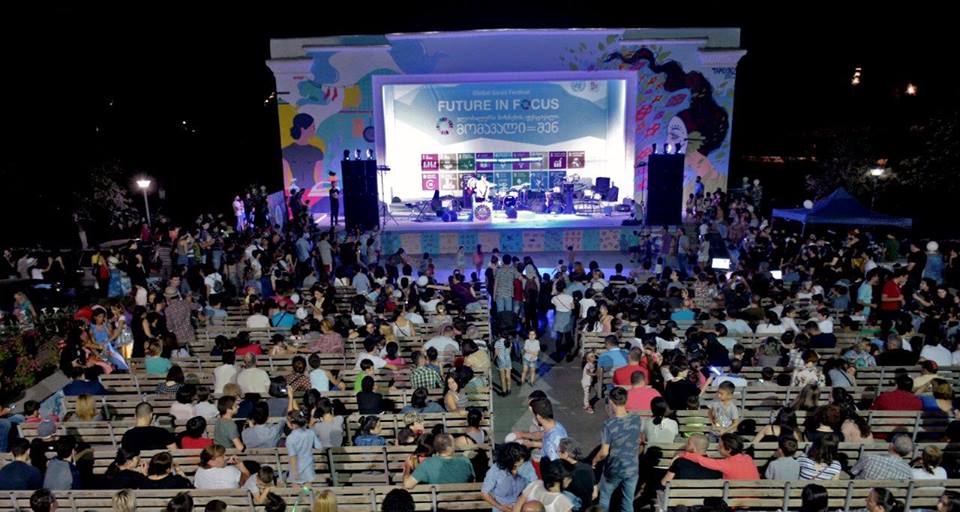 Awareness raising on SDGs was one of the main purposes of the project implemented by IDFI. At the first stage of SDG nationalization it was necessary to inform the public about the Global Agenda and Governmental plans in this direction. Meetings with CSO representatives, journalists, students, local self-governments and private sector were conducted throughout Georgia.
Awareness raising on SDGs was one of the main purposes of the project implemented by IDFI. At the first stage of SDG nationalization it was necessary to inform the public about the Global Agenda and Governmental plans in this direction. Meetings with CSO representatives, journalists, students, local self-governments and private sector were conducted throughout Georgia.
For engaging youth in SDG processes, IDFI and UNDP organized a “Street Art Day” on SDGs, visualization and essay contests and awarded winners during the international 16 Plus Forum hosted by Georgia at the end of October 2017. The focus of the Forum was SDG 16 – peace, justice and strong institutions. More than 150 participants from 25 countries attended the International Forum. A workshop with local and international CSOs was also conducted in the framework of the Forum and was led by the representatives of IDFI and World Federation of United Nations Associations (WFUNA).
The involvement of CSOs, private sector and academia in the SDG implementation process still remains a challenge, despite the comprehensive awareness raising campaign. To achieve progress in this direction within the framework of the new project supported by the UNDP and the Government of Sweden, IDFI and AoG will support and encourage the participation of various stakeholders in the Council and Working Groups. The project will involve organizing workshops on specific thematic directions for the representatives of CSOs, private sector and academia.
The project will be concluded with a conference where AoG, UNDP and IDFI will present the progress report, and highlight the main achievements of SDG implementation, existing challenges and future plans.
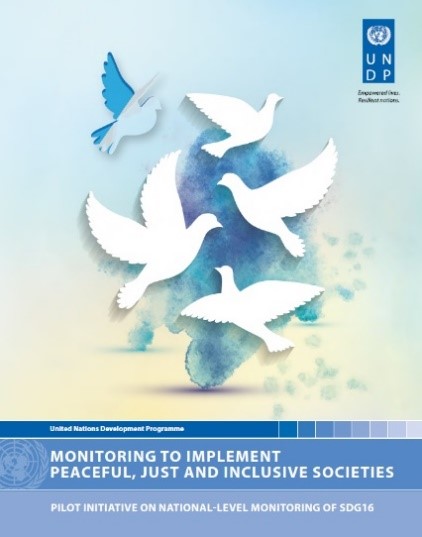
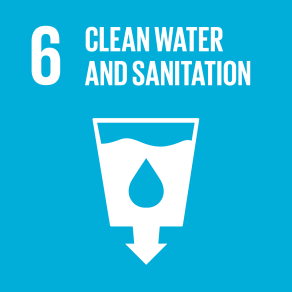 Author of the given Essay is the student of Tbilisi State University Lana Kapanadze. The Essay was prepared specifically for the
Author of the given Essay is the student of Tbilisi State University Lana Kapanadze. The Essay was prepared specifically for the 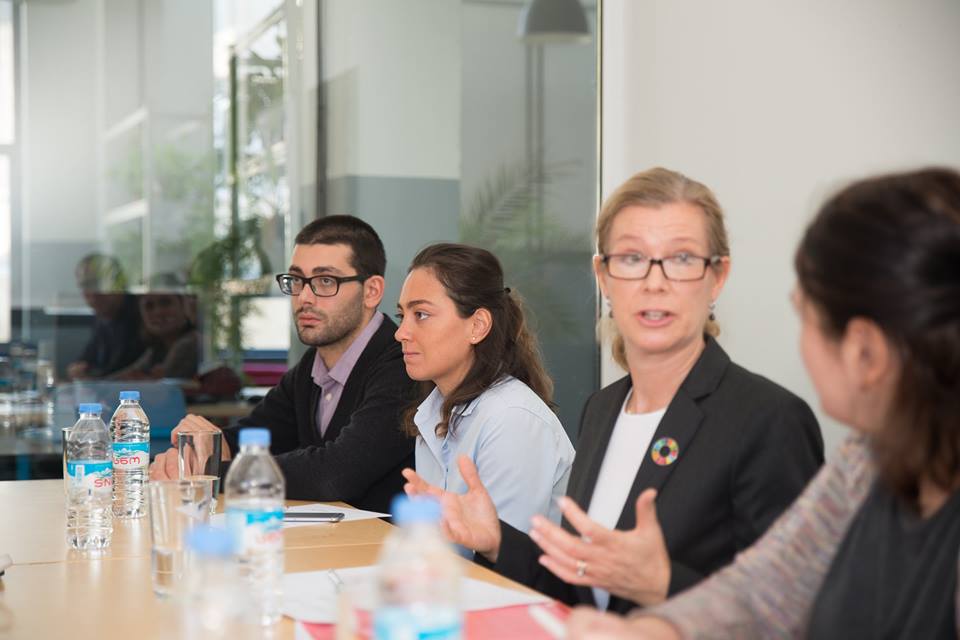 On October 27, 2017, at Impact Hub – Fabrika conference hall, the Embassy of Sweden in Georgia, UNDP Georgia, IDFI and Administration of the Government of Georgia (AoG) hosted an
On October 27, 2017, at Impact Hub – Fabrika conference hall, the Embassy of Sweden in Georgia, UNDP Georgia, IDFI and Administration of the Government of Georgia (AoG) hosted an 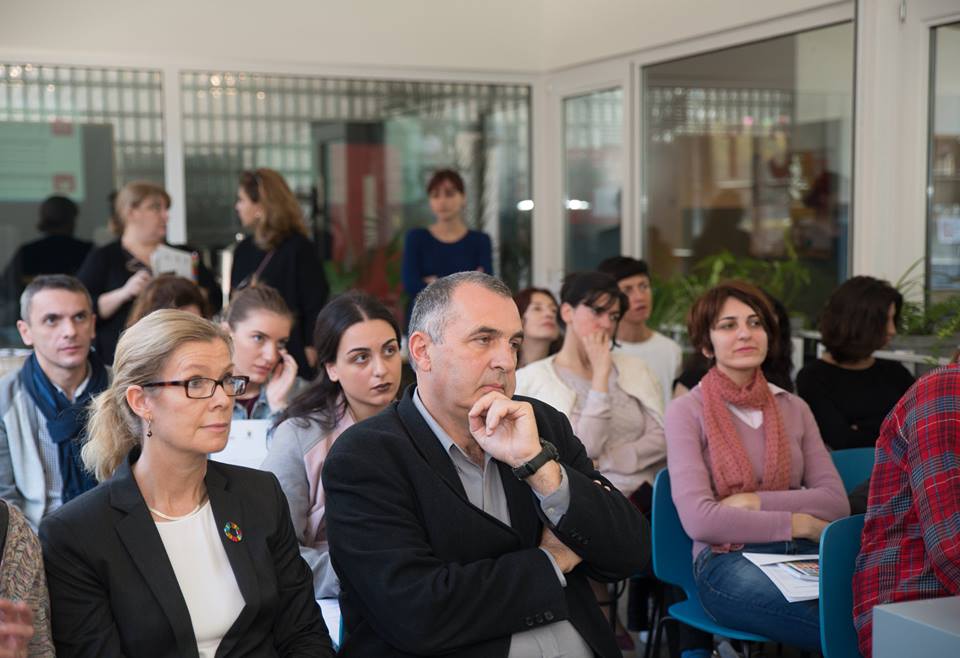 The meeting with the media took place on October 27, 2017, just a couple of days prior to the
The meeting with the media took place on October 27, 2017, just a couple of days prior to the 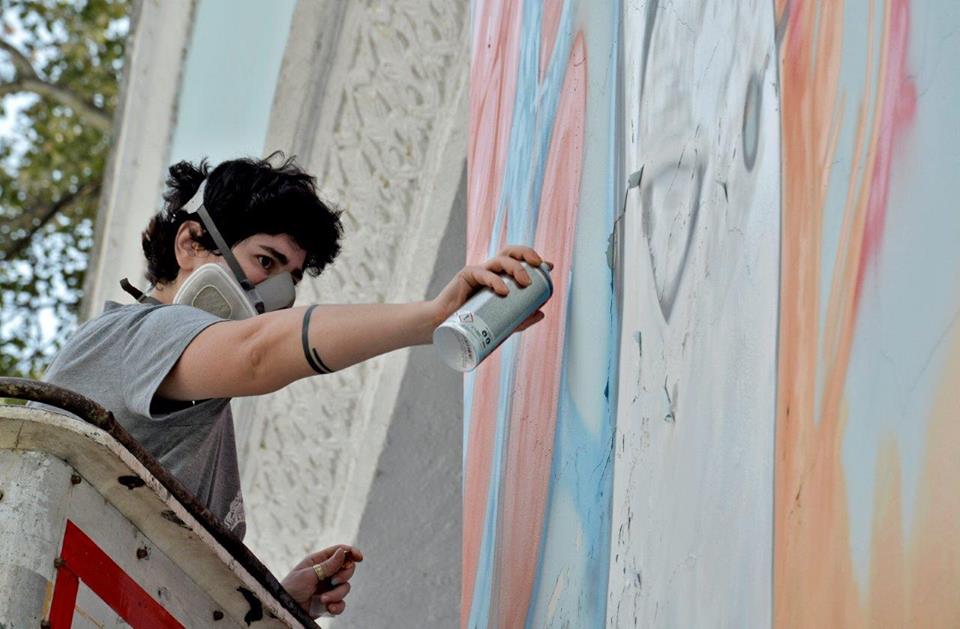 At the end of the day, Niels Scott, UN Resident Coordinator in Georgia, presented UN Goodwill Ambassadors in Sustainable Development Goals: Gela Charkviani – writer and publicist, Nino Sukhishvili – head of Georgian National Ballet, and Irma Khetsuriani – world champion in wheelchair fencing.
At the end of the day, Niels Scott, UN Resident Coordinator in Georgia, presented UN Goodwill Ambassadors in Sustainable Development Goals: Gela Charkviani – writer and publicist, Nino Sukhishvili – head of Georgian National Ballet, and Irma Khetsuriani – world champion in wheelchair fencing.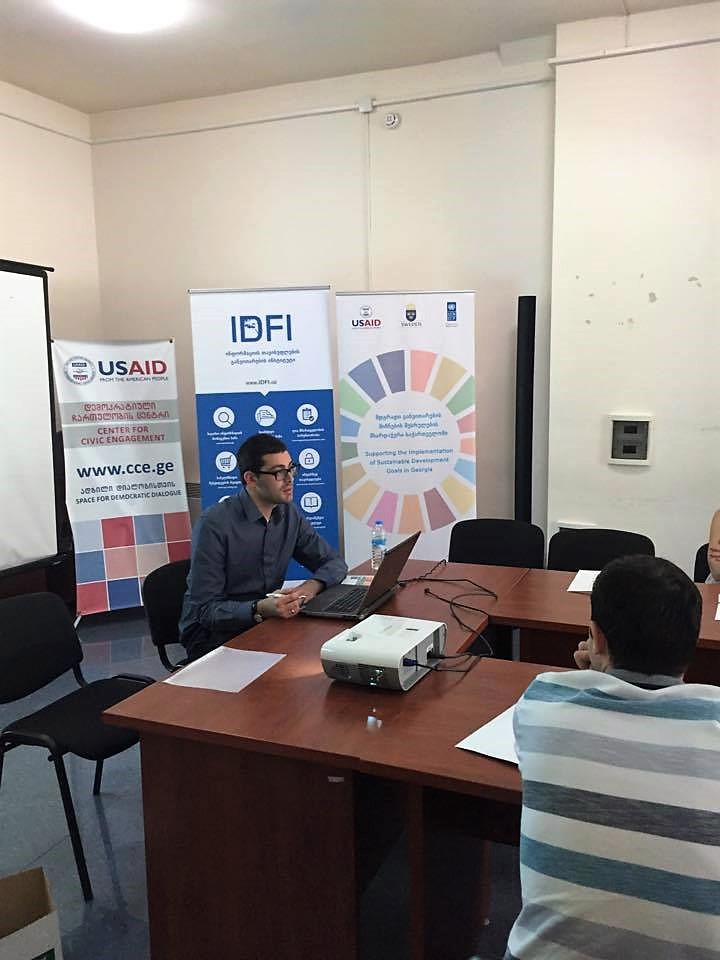 IDFI in cooperation with the United Nations Development Programme (UNDP), and with the financial support from the Government of Sweden hosted a meeting on the 2030 UN Sustainable Development Agenda at the Gori Civic Engagement Center.
IDFI in cooperation with the United Nations Development Programme (UNDP), and with the financial support from the Government of Sweden hosted a meeting on the 2030 UN Sustainable Development Agenda at the Gori Civic Engagement Center.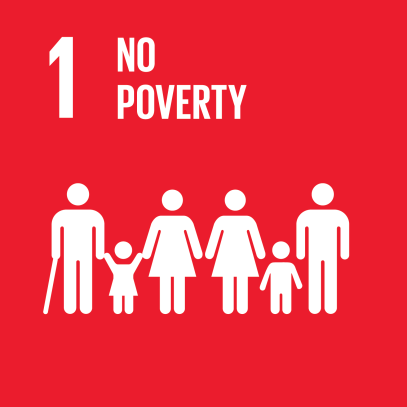 Author of the given Essay is the student of Georgian Technical University Ana Giorgashvili. The Essay was prepared specifically for the
Author of the given Essay is the student of Georgian Technical University Ana Giorgashvili. The Essay was prepared specifically for the